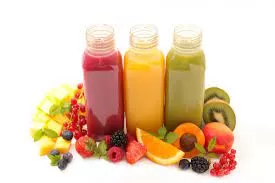
Date: January 18, 2024
In a comprehensive systematic review and meta-analysis, health researchers from the University of Toronto have uncovered a significant association between the consumption of 100% fruit juice and weight gain in both children and adults. The study, examining 42 research papers, highlights concerns regarding the high sugar and calorie content present in fruit juices, shedding light on the need for reconsideration of dietary choices.
The researchers scrutinized 17 studies focused on children and 25 on adults, with the findings suggesting a clear link between the intake of 100% fruit juice and an increase in body weight. Michelle Nguyen, lead author of the study and a Ph.D. Candidate at the Department of Nutritional Sciences Faculty of Medicine at the University of Toronto, emphasized the importance of incorporating both prospective cohort studies and randomized controlled trials (RCTs) to comprehensively assess the evidence.
Nguyen explained, “The use of both these study designs is critical to evaluate the totality of evidence.” The results reinforced the importance of limiting 100% fruit juice consumption, especially in young children, aligning with guidelines provided by the American Academy of Pediatrics (AAP).
The study attributed weight gain to the high sugar content in fruit juice, which, similar to soda, does not induce a feeling of fullness. Dr. Nate Wood, a physician at the Yale School of Medicine, compared fruit juice to soda, noting, “Although sugary water is high in calories, drinking it does not make us feel full. For this reason, the calories in sugary beverages like fruit juice are sometimes called ’empty calories.'”
The lack of dietary fiber in fruit juice compared to whole fruit forms poses challenges, leading to decreased satiety and overconsumption of these beverages. Nguyen emphasized the importance of delaying the introduction of 100% fruit juice in young children, moderating serving sizes, and opting for whole fruit alternatives.
Addressing the question of whether it is advisable to choose the actual fruit over its juice counterpart, Natalie Rizzo, MS, RD, author of Planted Performance, suggested, “As a matter of fact, older research states that kids who drink 100% fruit juice have higher intake and adequacy of dietary fiber, vitamin C, magnesium, and potassium.”
Nutritional guidelines recommended that children under 12 months should not be given any fruit juice. For those above 12 months, occasional consumption as a sweet treat is acceptable, emphasizing the importance of viewing fruit juice as a treat rather than a health food.
The study advocates for increased awareness and informed choices, with water emerging as the healthiest beverage alternative. While 100% fruit juice is not to be completely avoided, health experts recommend limiting the serving size to prevent overconsumption of calories and sugar.
Reveals Link Between 100% Fruit Juice and Weight Gain in Children and Adults
Date: January 18, 2024
In a comprehensive systematic review and meta-analysis, health researchers from the University of Toronto have uncovered a significant association between the consumption of 100% fruit juice and weight gain in both children and adults. The study, examining 42 research papers, highlights concerns regarding the high sugar and calorie content present in fruit juices, shedding light on the need for reconsideration of dietary choices.
The researchers scrutinized 17 studies focused on children and 25 on adults, with the findings suggesting a clear link between the intake of 100% fruit juice and an increase in body weight. Michelle Nguyen, lead author of the study and a Ph.D. Candidate at the Department of Nutritional Sciences Faculty of Medicine at the University of Toronto, emphasized the importance of incorporating both prospective cohort studies and randomized controlled trials (RCTs) to comprehensively assess the evidence.
Nguyen explained, “The use of both these study designs is critical to evaluate the totality of evidence.” The results reinforced the importance of limiting 100% fruit juice consumption, especially in young children, aligning with guidelines provided by the American Academy of Pediatrics (AAP).
The study attributed weight gain to the high sugar content in fruit juice, which, similar to soda, does not induce a feeling of fullness. Dr. Nate Wood, a physician at the Yale School of Medicine, compared fruit juice to soda, noting, “Although sugary water is high in calories, drinking it does not make us feel full. For this reason, the calories in sugary beverages like fruit juice are sometimes called ’empty calories.'”
The lack of dietary fiber in fruit juice compared to whole fruit forms poses challenges, leading to decreased satiety and overconsumption of these beverages. Nguyen emphasized the importance of delaying the introduction of 100% fruit juice in young children, moderating serving sizes, and opting for whole fruit alternatives.
Addressing the question of whether it is advisable to choose the actual fruit over its juice counterpart, Natalie Rizzo, MS, RD, author of Planted Performance, suggested, “As a matter of fact, older research states that kids who drink 100% fruit juice have higher intake and adequacy of dietary fiber, vitamin C, magnesium, and potassium.”
Nutritional guidelines recommended that children under 12 months should not be given any fruit juice. For those above 12 months, occasional consumption as a sweet treat is acceptable, emphasizing the importance of viewing fruit juice as a treat rather than a health food.
The study advocates for increased awareness and informed choices, with water emerging as the healthiest beverage alternative. While 100% fruit juice is not to be completely avoided, health experts recommend limiting the serving size to prevent overconsumption of calories and sugar.










